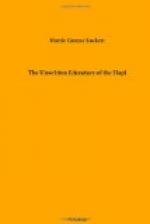“The names given relate in some way to the clan of the one who bestows them. Of the various names given to the child, one, because it strikes the fancy of the family, generally sticks ... until the individual is initiated into some ceremony. At that time a new name is given.”
For instance, a Hopi man of middle age, known to the writer as George (school name), tells her that his adopted father belonged to the Tobacco Clan, so the name selected for him by the paternal aunts was “Sackongsie” or “green tobacco plant with the blossoms on.” Bessie, born in the same family, was named “Sackhongeva” or “green tobacco plant standing straight.” The nine month’s baby daughter of a Hopi girl once in the employ of the writer is merrily called “Topsy,” although formally named Christine in honor of the school superintendent’s wife. Her mother explains that the father’s clan is Tobacco, and the aunts named this baby “Topt-si,” “the red blossom on top of the tobacco plant,” which sounds so exactly like Topsy that the family sense of humor has permitted the nickname. One of the writer’s Hopi girls was named “two straight, tall rows of corn,” another, “Falling Snow.” These pretty names, too long for convenience, are nevertheless cherished, as a matter of sentiment, by their owners.
[Footnote 33: Goddard, P.E., Indians of the Southwest: N.Y. Amer. Mus. Nat. Hist., Handbook Series No. 2, 1921.]
=Marriage=
The following is Hough’s[34] description of the wedding ceremony at Oraibi: “When the young people decide to be married, the girl informs her mother, who takes her daughter, bearing a tray of meal made from white corn, to the house of the bridegroom where she is received by his mother with thanks. During the day the girl must labor at the mealing stones, grinding the white meal, silent and unnoticed; the next day she must continue her task.... On the third day of this laborious trial she grinds the dark blue corn which the Hopi call black, no doubt, glad when the evening brings a group of friends, laden with trays of meal of their own grinding as presents, and according to the custom, these presents are returned in kind, the trays being sent back next day heavy with choice ears of corn.




